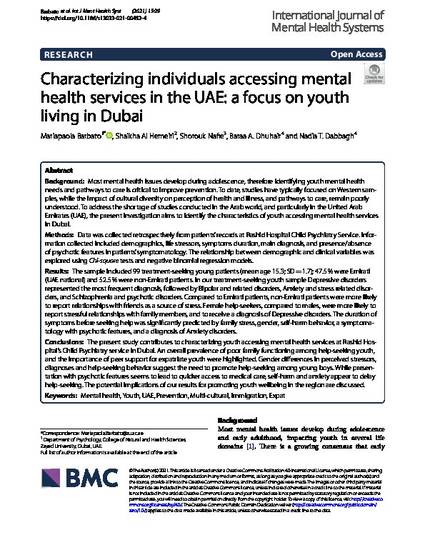
Background: Most mental health issues develop during adolescence, therefore identifying youth mental health needs and pathways to care is critical to improve prevention. To date, studies have typically focused on Western samples, while the impact of cultural diversity on perception of health and illness, and pathways to care, remain poorly understood. To address the shortage of studies conducted in the Arab world, and particularly in the United Arab Emirates (UAE), the present investigation aims to identify the characteristics of youth accessing mental health services in Dubai. Methods: Data was collected retrospectively from patients’ records at Rashid Hospital Child Psychiatry Service. Information collected included demographics, life stressors, symptoms duration, main diagnosis, and presence/absence of psychotic features in patients’ symptomatology. The relationship between demographic and clinical variables was explored using Chi-square tests and negative binomial regression models. Results: The sample included 99 treatment-seeking young patients (mean age 15.3; SD = 1.7); 47.5 % were Emirati (UAE national) and 52.5 % were non-Emirati patients. In our treatment-seeking youth sample Depressive disorders represented the most frequent diagnosis, followed by Bipolar and related disorders, Anxiety and stress related disorders, and Schizophrenia and psychotic disorders. Compared to Emirati patients, non-Emirati patients were more likely to report relationships with friends as a source of stress. Female help-seekers, compared to males, were more likely to report stressful relationships with family members, and to receive a diagnosis of Depressive disorders. The duration of symptoms before seeking help was significantly predicted by family stress, gender, self-harm behavior, a symptomatology with psychotic features, and a diagnosis of Anxiety disorders. Conclusions: The present study contributes to characterizing youth accessing mental health services at Rashid Hospital’s Child Psychiatry service in Dubai. An overall prevalence of poor family functioning among help-seeking youth, and the importance of peer support for expatriate youth were highlighted. Gender differences in perceived stressors, diagnoses and help-seeking behavior suggest the need to promote help-seeking among young boys. While presentation with psychotic features seems to lead to quicker access to medical care, self-harm and anxiety appear to delay help-seeking. The potential implications of our results for promoting youth wellbeing in the region are discussed.
- Expat,
- Immigration,
- Mental health,
- Multi‐cultural,
- Prevention,
- UAE,
- Youth
Available at: http://works.bepress.com/mariapaola-barbato/5/
